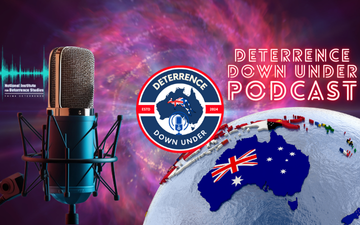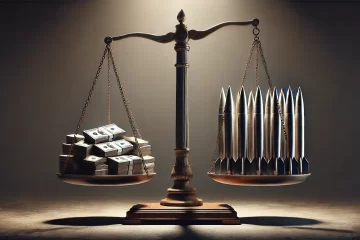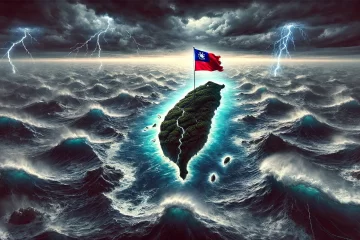The coronavirus is the most significant health, security, economic, and geopolitical challenge that the world has experienced since World War Two. The global pandemic has challenged the United States’ capacity and readiness to lead international efforts during this transformative crisis to overcome the global health emergency. The disarray has tested the effectiveness and the resilience of global and regional institutional frameworks, underscored the significance of the nation-state, and sidelined supranational institutions while intensifying and accelerating the ideological and great power rivalries. Although it is still early to predict which trends will prevail, it is clear that the global pandemic will reshape international relationships, perceptions, ideas, and visions over the rules, structures, and organizing principles of the Post-COVID-19 world order.
The spread of the virus caught the U.S flatfooted and disoriented as Washington found itself with no capacity to contain the virus effectively nor willingness to lead a unified front of the leading nations to blunt the crisis. The lack of U.S leadership to call countries to act, to set the agenda and to chart a path beyond the point of crisis, raised doubts about its role in the world and opened the way for China and Russia to cast themselves as the new leaders filling the shoes of the United States.
The public health crisis laid bare the limits of international organizations and global institutional frameworks as they seem to be watching from the sidelines. By downplaying the severity of the novel coronavirus and delaying the declaration of a worldwide health emergency for two months, not to mention Beijing’s growing influence on its decision making, the WHO failed its core mission to alert the international community about the COVD-19 and its possible ramifications, contributed to the ongoing crisis. In parallel, the inaction of the United Nations Security Council (UNSC) to organize a response to the global pandemic further undermined the legitimacy of the world’s highest deliberative body.
Furthermore, the crisis has exposed the structural deficiencies of the European Union. As healthcare (in addition to national security, terrorism, and fiscal policies) remains the responsibility of national governments, so Brussels no capacity nor authority to lead an organized response, conceding to the member states to take the lead on the issue. Moreover, the combination of the pandemic, the economic implications of the crisis and the continued failures of member states to agree on recovery programs, could also conspire to reverse the gains that the European project has made in the last few decades and radically shift the European political landscape.
Meanwhile, in the face of global institutional paralysis, the nation-state reasserted itself. This has been particularly evident in the EU, where the virus accentuated the existing distrust between the EU members and revealed deep-seated structural weaknesses of the Post-Westphalian frameworks. As the member states, closed down borders, refused to aid one another and focused on distinct crisis management methods, they revealed their deep-seated Hobbesian selfishness, undermined intra-European solidarity and increased the sense of coming apart while reinforcing the sense of the indispensability of the nation-state for expertise, control, and assurance.
The absence of the U.S. leadership and the disorganization and preoccupation of its European allies with their domestic health crises has disabled NATO’s ability to function effectively and act decisively against the pandemic. NATO’s inexperience to deal with such a challenge, led some members even to signal that the virus was not something they needed to act upon. However, the fast spread of the coronavirus made a crippling impact on the U.S. naval activities and NATO military exercises. The spread of COVD19 on the USS Theodore Roosevelt paralyzed, albeit not operating under the auspice of NATO, an American aircraft carrier, the first time since World War Two. NATO was forced to scrap its largest military exercise, DEFENDER-Europe20. Furthermore, several other exercises linked to DEFENDER-Europe20, including and not limited to the Dynamic Front, the Joint Warfighting Assessment, and the Saber Strike and SwiftResponse have been postponed as well, underscoring the fragility of NATO’s military operations and deterrence posture in Europe while questioning its credibility and purpose again.
The global pandemic intensified and accelerated the global great power rivalry as Beijing and Moscow have moved quickly and effectively to take advantage of the openings created by the U.S. retrenchment and inward-looking policies to fill the void of Washington’s global leadership. Although both China and Russia are revisionist powers by nature, and both are trying to weaken the U.S., their objectives and visions of the world order differ markedly. While Russia intends to undermine the current international order, China is seeking global leadership within the order.
China intends to cast itself as a global savior. It wants to tout its authoritarianism as the key and decisive factor in defeating the pandemic while chipping away at the U.S. dominant status. With massive lockdowns, the imposition of electronic surveillance measures, and the arrests of those who may have exposed its deficiencies, Beijing managed to put this fast-spreading virus under control, striving to create a strong case for authoritarian rule. As Beijing dispatched the bulk of masks, ventilators, respirators, protective suits, test kits, and medical workers to Europe, China tried to boost its role and international status as well as advertise the efficiency, effectiveness, and indispensability of its authoritarian model. In parallel, Beijing organized and led international forums, videoconferences, and panel discussions to highlight, publicize and politicize its policy decisions while attempting to displace the U.S. as the world’s first responder, the global crisis manager, and the world role model.
Russia did not let a good crisis to go waste either as it unleashed a barrage of disinformation campaigns aiming at on the one hand to sow distrust and discord in the West, and on the other to burnish its tainted image, portraying itself as a good neighbor willing to assist all countries in dire need of support. Pro-Kremlin media outlets accused a Harvard professor of creating the COVID19 and blamed the U.S. army for disseminating it. In the same vein, the Kremlin sent medical equipment, health responders and other forms of medical aid to European countries not to assist the virus stricken states, but to aggravate public health calamity, undermining public trust in the healthcare systems, the local governments, and democratic institutions. Moreover, Russia shipped medical gear to New York to undermine the U.S. role as a leading health care provider and to showcase Russia’s clout.
The U.S. Can’t Afford to Lose its Leadership Role
The United States could have galvanized allies, partners, and even competitors into action against the pandemic and avoided the global authoritarian pushback as the U.S. has extensive experience in mobilizing broad coalitions to address challenges to similar nature. The U.S. led all-out efforts to contain the spread of infectious outbreaks in the early 2000s. Both President Bush and Obama successfully employed the G-20 to contain the spread of HIV and Ebola outbreaks. In 2003, George W. Bush mobilized around $90 billion, the largest amount of money ever committed by any nation to a single disease, for his emergency program to ensure HIV/AIDS treatment, prevention, and research, saving over 17 million lives. While rallying the UN Security Council (UNSC) behind his plan and assembling thousands of medical workers, Barak Obama deployed the 2,800 troops in Guinea, Liberia, and Sierra Leone to detect, contain, and eliminate Ebola.
An international order strained by the virus had already faced challenges more significant than at any time since the height of the Cold War. Rising authoritarian states such as China and Russia have been threatening to undermine the Liberal World Order that has subdued great power conflicts and kept global peace in the last few decades. In Asia, Africa, and a vast swath of Europe, China has been expanding its clout and trying to control a considerable share of global commerce flows. While invaded Georgia, annexed Crimea, and attacked Eastern Ukraine, Russia carved out a sphere of influence in the former Soviet space and created the first major crack in the international security architecture. With supporting Bashar al Assad in Syria, backing Iran and alienating Egypt and Turkey from the United States, Moscow increased its influence in the Middle East and challenged the U.S. unipolar moment in the region. Moreover, Russia’s hybrid attacks on the West that includes and not limited to disinformation, propaganda, cyber-attacks threaten the cohesion and legitimacy of the Western political establishments while making Russian narratives effective factors in shaping attitudes, public opinions, and false perceptions in Western societies.
Considering visible authoritarian pushback, the United States can’t afford to give up its global role as its disengagement would far outweigh its costs. It would weaken NATO, undermine the EU and deepen Moscow/Beijing tandem’s bilateral ties with individual nation-states in Europe while helping mushroom authoritarian regimes across the old continent. In parallel, the re-assertiveness of the nation-state coupled with the increasing nationalism, growing inequality, and economic recession could also play into the hands of the revisionist powers and lead to the unprecedented social and geopolitical ruptures in Europe. Consequently, the growing political divergence, division or fragmentation of the EU in any sort, could shatter the European project, the cornerstone of the U.S. international security architecture and precipitate the final collapse of the world America made.
Given the growing dangers of the great power rivalry and ongoing power shift to the East, both sides of the Atlantic need to be reminded of what is at stake here, as the survival of the Liberal World Order as we know it lies in the strength and unity of the transatlantic community. Thus, U.S. engagement and leadership can make an enormous difference over how the world could look like the 2020s and 2030s. Washington’s passive role will be dangerous. U.S. isolation and retrenchment in the 1930s created a breeding ground for Nazi Germany, Fascist Italy, and imperialist Japan, inviting the most destructive conflict in history.
The U.S. engagement and commitment to its allies after World War Two, spearheaded by the Marshal Plan, laid the groundwork for strong NATO, the prosperous European Community, and final victory over the Soviet Empire. The newly emerged the Liberal World Order, after the collapse of the communist bloc in the1990s, led by the United States, benefited billions of people around the world. It helped Europe thrive, raised the standard of living, lifted billions out of poverty, brought unprecedented economic prosperity, opened political systems, and kept the world a peaceful place.
Thus, none of this would have been possible without the U.S. strong global leadership and willingness to work closely with allies and partners through NATO, the EU, and other global and regional international frameworks. The pandemic has shown how interdependent and integrated the world has become in the last three decades. Considering the global trends such as the revolutions in the communication and information technology as well as dramatic changes in population, resources, economics, governance, and security, not to mention “the rise of the rest,” any radical shift towards isolation or autarchy would have devastating effects on social, cultural, political, economic and military aspects of the West. To meet and overcome these challenges, the United States needs to call into action not only allies and partners, but leaders in business and civil societies to coordinate their actions. Notably, the U.S. needs to think more comprehensively about NATO-EU strategic partnership and invest more in their approximation efforts as the cooperation between the two will be vital in determining the winners and losers as well as shape and characteristics of the Post-COVID world.
About the Author
Miro Popkhadze
Miro Popkhadze is a Fellow at FPRI’s Eurasia Program. He was the Georgian Ministry of Defense Representative to the United Nations from 2015 to 2019. Prior to this assignment, he served as the Assistant Defense Attaché at the Embassy of Georgia to the United States in Washington, DC. Popkhadze was a non-resident Fellow at the Atlantic Council of Georgia in Tbilisi.



